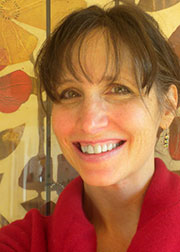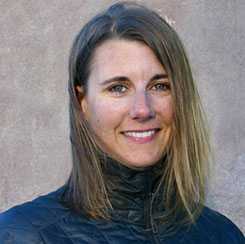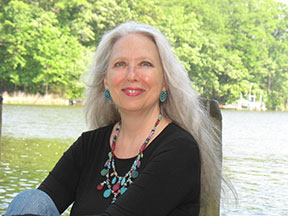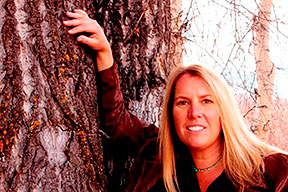
typed the final words, “The End.” The manuscript was complete. I did it. I wrote a novel. I should have felt triumphant. After all, I had quit my job a year and a half ago with this very goal in mind. I wanted to be a writer. And writers wrote novels. I even told all my friends I was writing a book. I sent the completed manuscript off to a couple people who offered to be my critique partners.
My manuscripts finally returned, marked up with helpful suggestions, which I read through with complete apathy. I knew rewriting was an essential part of the process. I knew many authors could spend as long, if not longer, working on revisions than writing the initial book. I got that. I wasn’t discouraged or overwhelmed. I just didn’t care about the project anymore.
I set it aside—hoping I was just burnt out from the month-long push of revisions. But a creeping dread burned through me. I didn’t want to work on the manuscript. Not now. Not later. In fact, the thought of writing fiction no longer interested me. But if I didn’t write novels, like all the other writers I knew, maybe I wasn’t really a writer. I was plunging, head first, into what I would later refer to as my writer’s identity crisis.
As Lora Freeman Williams, freelance writer and the Writers’ Life & Business Coach says, “I think the key here is the persistence of the experience . . . the ebb and flow. When we’ve tried everything, but the dry spell doesn’t ease up—there is no ebb and flow to the writing experience and creative process we’re used to—just a continuous ebb—we’re at a different juncture.”
That was it. I was at a different juncture.
Instead of throwing in the writing towel completely, I took two months off from writing to look inward and reexamine my identity and desires.

“When we’ve tried everything, but the dry spell doesn’t ease up . . . we’re at a different juncture.”
(Photo: Lora Freeman Williams)
The Transition
If your writer’s identity is in flux, you may find yourself, as I did, in an undefined transition. It can feel a little unsettling, like being in a creative limbo. But rather than sinking into a writer’s despair, sit back and relax. What you may discover during the transition may lead you to a deeper and more focused place in your writing.
Elizabeth Ayres, author, award-winning newspaper columnist, and founder of the Elizabeth Ayres Center for Creative Writing, offers this advice, “I try to encourage people to realize that when you write, a greater or deeper or higher or more whole self emerges. So if you’ve been writing fiction and begin to discover you really want to write poetry, I think it eases the transition by recognizing, ‘This is the me I’ve always been, appearing in this world at long last. I welcome her!’” She also reminds writers, “The writer is always in a different state of awareness after than before working, is always one notch closer to becoming who she aspires to be—both as a writer and as a person.”
Transition, then, is a natural part of the growth in writing. It’s not the exception; it’s the norm. Lora agrees but cautions, “Dormant times are natural, and it can be useful to tap into the reality that is all around us—that new life does inevitably come after death. However, it can be tempting to jump too quickly into: what next? It’s important to take some time to simply be where we are. Yes, we need to know that there is a next, but going there too quickly can short circuit the learning process and the natural timing of things.”
Alissa Johnson, author, freelance writing coach, and creator of Writing Strides, an online resource for writers, adds, “Sometimes in order to get through a transition, you need to get really comfortable with your discomfort. We have to become practiced at observing and interpreting those feelings of ambiguity and discomfort. Are we merely tired? Do we just need to push through to a deadline, and we’re tired because we’ve been eating, sleeping, and breathing a particular project? Or is it outright fear? Are we feeling uncomfortable about the level to which this project is exposing our feelings, experiences, etc.?”
Instead of panicking and fighting the transition, I allowed myself two full months to journal and internalize the process. I hid the manuscript and let go of my self-imposed definition of being a writer. I read books again for the sheer joy of it—not just an exercise to see what I could glean from a particular writing style—but because I truly enjoyed the beauty of the words. It helped to look inward and shut out the noise.
Elizabeth encourages writers who are feeling a push in a new direction: “Take seriously the nudge to do something different. Honor it. Don’t try to cling to an old form if something else is beckoning.”

“Sometimes in order to get through a transition, you need to get really comfortable with your discomfort.”
(Photo: Alissa Johnson)
Shooing the “Shoulds”
No matter our journey with writing, it’s sometimes difficult to shake the external (and internal) voices telling us what we should be doing. As I eased my way back into the online world of blogging and social media, I was faced with gurus telling me how I should be writing and writer friends publishing or chatting about their manuscript revisions. Since putting my book away, I felt a little out of step with my writing peers, even though I knew in my heart I was right where I needed to be for this moment.
Lora puts all those expectations we place on ourselves in perspective. “One of the biggest mistakes the writers I coach make is to try to fit themselves into a category of writing or a particular business model because they should—should write in an area they don’t really find interesting; should write in a way that someone else writes, even if it doesn’t work for them personally; [or] should take a project that pays really well but stresses them out excessively. We need to work with the reality of our true selves, not some theoretical idea of what we should be.”
My love of writing is firmly embedded in my identity and was never a doubt. What was in question was the direction I wanted to go with my writing. What I learned through this process was that it was, well, a process. As Lora suggests, the death of one area always gives birth to a new area. And as Elizabeth encourages, change and growth are a natural part of the writing process. The more we write and allow ourselves to be revealed, the more likely we are to learn about ourselves, our writing, our hearts, and our souls.
But to allow ourselves the time to look inward honestly, we need to ignore the expectations. Only then can we find our true purpose and begin to move forward.
Discover Passions (Again)
I realized after spending so much time focusing on a genre I no longer loved, I needed to discover exactly where my writing passions were. Elizabeth says, “Forget about the labels! Get back to the pure joy of putting words on the page, however they want to tumble out.”
I started paying attention to the kinds of writing and reading that triggered my passions. Not surprisingly, I realized the majority of my reading involves nonfiction. Although I read fiction, it is not my first love. How had I missed this big clue? I’d spent a year and a half writing a book I probably would never read or buy! It was time to start playing with the style of writing I found invigorating.
Alissa emphasizes how important it is to find joy again, not just with writing, but with life. “Enjoy life itself because all writing comes from life one way or another, and you have to find your own joy if you’re going to find joy in your writing.”
During my two month hiatus, I nurtured interests, like fun reading, hiking, baking, practicing my mandolin, and free writing—reminding me that joy in life will indeed feed my creative expression.

“Forget about the labels! Get back to the pure joy of putting words on the page, however they want to tumble out.”
(Photo: Elizabeth Ayres
Explore New Paths
I finally felt ready to take my writing to the world again. Since my timing converged with the start of the new year, it was just the right incentive to think about looking forward. I decided to make 2013 the Year of Yes. If an interesting project presented itself, I would seize the opportunity. I explored the Internet. There were lots of blogs calling for articles or columns. I even snagged an opportunity to write a short monthly travel post, a long-held dream of mine.
No past experience goes to waste when it comes to exploring new writing opportunities. For years, I worked as a career counselor in higher education. We often told the students that every job, no matter how small or menial, had valuable transferrable skills that could be applied to a career later.
Lora suggests the same principle applies with writing. “I recommend people take an inventory of everything they’ve done or received training in and consider their interest level in each of those areas. Our parenting experience, relationships, jobs, books we’ve read, seminars we’ve attended—they all feed into a well of knowledge we might find juicy bits for writing inspiration and work.”
When seeking new directions, Alissa also encourages writers to get out from behind their desks and interact with other writers. “That in itself can lead to new ideas or perspectives, or at least leave you more refreshed when you get back to your own desk.”
I found trying new challenges and meeting with other writers invigorating. Instead of feeling at a loss or like a failure about the manuscript that remained stashed in my drawer, I found a renewed hope and love of writing and new subjects to explore. And perhaps not coincidentally, as I looked out and forward, doors started opening. Writing is exciting again.
Elizabeth summed up my feelings when she so eloquently said, “I think the most important suggestion I could make is that a writer never regard her work as a career. Writing is a sacred vocation, from the Latin vocare, meaning to call or summon. If you recognize that the words flowing forth from the tip of your pen are, in fact, the you of the future calling to the you of the present, why would you want to cling to the you of the past?”
Reinvigorate Your Writing
Alissa Johanson, Lora Freeman Williams, and Elizabeth Ayres offer practical tips to jump-start the writing juices and reinvigorate a tired and weary writing soul.
Elizabeth Ayres
“Creativity is a right-brain function. Creative writers are automatically at a disadvantage because we’re trying to execute a right-brain task with a left-brain tool.”
- Try pictures—cut out pictures from a magazine that represent the feel of a story you want to write or look like the characters or setting you are trying to create.
- Write with your non-dominant hand. It is an extremely effective way to tap into that other self that’s trying to emerge.
- Elizabeth’s book, Writing the Wave: Inspired Rides for Aspiring Writers, offers creative writing prompts and exercises to help writers tap into their own wellsprings of creativity. (Elizabeth also offers online classes and workshops. For more information check out her school’s website.)
Lora Freeman Williams
“Sometimes, when we’re not cultivating our creative space, the ‘business’ of writing can really dry us up creatively.”
- Keep up the journaling practice. Make it as creative as you want it to be. (For fun and stimulating ideas, check out Lora’s online class, Keeping it Juicy.)
- Join a group to find support. Check out Meetup.com for local writers/creative groups that are free or inexpensive. LinkedIn also has many writing-focused groups, such as The Freelance Writers’ Connection, which Lora runs.
- Be aware of your physical health. If focus is waning in multiple areas of life, not just the writing, then it might be time to look at areas like eating, sleeping, exercise, and hydration.
Alissa Johnson
“Abandon any pretense of being good. In fact, give yourself permission to write badly. It’s only when we’re freed from expectation that we can start to create for the sake of creating.”
- Try free writing in longhand. The act of moving the hand across the page, pen across paper, can teach you to connect with your thoughts and feelings.
- Replenish your energy with other things besides writing. Go outside and play or exercise. Try a hike or go to a museum.
- Check out resources on writing. Look for craft books and ideas or take an online class. (Alissa offers online classes and workshops. For more information check out her website, Writing Strides.)

Julie Luek is a freelance writer living in the mountains of Colorado. She holds an MA in education with an emphasis in counseling. Julie is published in regional and national magazines and is a biweekly contributor to She Writes and a monthly contributor to the blog, Chiseled in Rock. She is the author of two blogs, In Fine Company and A Thought Grows. Julie is still on the quest to discover her calling, but knows her heart has found its home in the words on the page.
-----
Enjoyed this article? You may also like:
Creative Brainstorming for Writers
Take a Break for Creativity
Making the Leap: The Transition into Fulltime Writing
Retreat Between the Pages: An Interview with Elizabeth Ayres